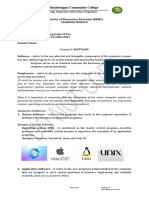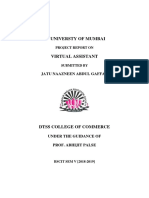Cybercrime Information Gap Activities Tests
Cybercrime Information Gap Activities Tests
Uploaded by
Yuly Vibiana Gutierrez LampreaCopyright:
Available Formats
Cybercrime Information Gap Activities Tests
Cybercrime Information Gap Activities Tests
Uploaded by
Yuly Vibiana Gutierrez LampreaOriginal Description:
Copyright
Available Formats
Share this document
Did you find this document useful?
Is this content inappropriate?
Copyright:
Available Formats
Cybercrime Information Gap Activities Tests
Cybercrime Information Gap Activities Tests
Uploaded by
Yuly Vibiana Gutierrez LampreaCopyright:
Available Formats
You are going to hear a radio programme. Listen to the first part of the programme.
According
to Inspector Peters, what is “cyber crime”?
Cyber crime...
Now listen to the whole programme and decide if the following sentences are true or false.
Then correct the false sentences.
1. According to Inspector Peters, most teenagers use the Internet for cyber bullying. T / F
2. Sending someone a threatening text message is an example of cyber bullying. T / F
3. Cyber bullies are never punished. T / F
4. Inspector Peters believes people shouldn’t take cyber bullying seriously. T / F
5. Many schools are trying to deal with the problem of cyber bullying. T / F
Listen to the whole programme again and complete the sentences below.
1. I used to be involved with a special ___________________ of the police that investigates cyber crime.
2. Bullies put their victim’s photos on the Internet without their _______________________.
3. Do you have any _________________________ for someone who is being cyber bullied?
4. Teenagers can get more advice at ________________________ like www.bullying.co.uk.
Which of the following do you Complete these definitions with the correct word:
think it is used to help prevent 1. ________________ means sending out-e-mails from false
cyber crime? financial institutions to try to obtain confidential
a. firewall details.
b. phishing 2. ______________ is a program that steals people’s personal
information.
c. spyware
3. A ______________ is a program that protects a computer
against cybercrime “attacks”.
You are going to hear a radio programme. Listen to the first part of the programme. According
to Inspector Peters, what is “cyber crime”?
Cyber crime... includes crimes committed using computers, such as identity theft, credit card fraud
and hacking.
Now listen to the whole programme and decide if the following sentences are true or false.
Then correct the false sentences.
1. According to Inspector Peters, most teenagers use the Internet for cyber bullying. T / F
(Most teenagers replied that they chatted, watched music videos and sent instant messages and e-mails)
2. Sending someone a threatening text message is an example of cyber bullying. T / F
3. Cyber bullies are never punished. T / F
(When the police find out who the bully is, they make sure his or her ISP –Internet Service Provider – is closed
down).
4. Inspector Peters believes people shouldn’t take cyber bullying seriously. T / F
(He believes that if someone gets a frightening text message or e-mail, she/he should immediately
report it to an adult, such as a parent or a teacher)
5. Many schools are trying to deal with the problem of cyber bullying. T / F
Listen to the whole programme again and complete the sentences below.
1. I used to be involved with a special ___branch_________ of the police that investigates cyber crime.
2. Bullies put their victim’s photos on the Internet without their ___ knowledge___________.
3. Do you have any ____tips_________________ for someone who is being cyber bullied?
4. Teenagers can get more advice at ____sites_______________ like www.bullying.co.uk.
Which of the following do you Complete these definitions with the correct word:
think it is used to help prevent 1. __Phising_________ means sending out-e-mails from false
cyber crime?
financial institutions to try to obtain confidential details.
a. firewall
2. __Spyware_____ is a program that steals people’s personal
b. phishing
information.
c. spyware
3. A __firewall_____ is a program that protects a computer
against cybercrime “attacks”.
Audio File Link:
Part 1: http://filecloud.io/qop7n5shw
Part2: http://filecloud.io/4im2gaf8x
Part 1:
Christine: Welcome to Cyber Talk – the programme where we talk about the world of computers
and technology. Tonight’s special guest is Inspector Peters. Good evening, Inspector
Peters.
Inspector: Hello, Christine.
Christine: Inspector Peters, what has your job got to do with technology?
Inspector: Well, I used to be involved with a special branch of the police that investigates cyber
crime. That includes crimes like identity theft, credit card fraud and hacking – all of
which are committed using computers. These days I work with the community to help
combat cyber bullying.
Part 2:
Christine: Can you explain what cyber bullying is?
Inspector: Embarrassing someone or spreading rumours on the Internet or via text messages to
mobile phones is called online- or cyber bullying. As part of my job, I visit schools to talk
to students about their use of the Internet. Recently, I asked a group of kids what
they did online. Most replied that they chatted, watched music videos, and sent
instant messages and e-mails. Those were typical answers. But one student admitted
that he was being bullied online.
Christine: How can someone be bullied online?
Inspector: There are several ways. Sometimes bullies put their victims’ photos on the Internet
without their knowledge, or they send their victims nasty or frightening text messages
or e-mails. Other times, they spread lies and rumours about them on the Internet.
Sometimes they send text messages threatening the victim with violence.
Christine: Why do you think teenagers do this?
Inspector: Most cyber bullies don’t think that what they’re doing is that terrible. They think it’s
funny. Sometimes their friends encourage them to do it. Another reason might be that
they can bully someone and they’re sure they won’t get caught.
Christine: What happens if someone is caught cyber bullying? Are they punished?
Inspector: Well, when we find out who the bully is, we make sure his or her ISP – Internet Service
Provider – is closed down.
Christine: So have you got any tips for someone that is being cyber bullied?
Inspector: Christine, cyber bullying is a serious matter. If you get a frightening text message or e-
mail, you should immediately report it to an adult that you trust, such as a parent or a
teacher. Phoning the mobile phone service provider is a good idea, too. The provider
can find out who owns the mobile phone. Teenagers can get more advice at sites like
www.bullying.co.uk. In addition, many schools have got systems where students can
report cases of online bullying. So you see, there’s actually a lot you can do if you’re
being bullied.
Christine: There certainly is, Inspector. Thanks for the helpful information.
Inspector: You’re welcome. Any time.
http://www.authorstream.com/Presentation/kunalahuja-1861055-cyber-crime/
You might also like
- Outline For Informative SpeechDocument4 pagesOutline For Informative SpeechDaniella Sanchez78% (9)
- Living in The IT Era - Lesson 3 Activity 3Document10 pagesLiving in The IT Era - Lesson 3 Activity 3Mart ZedrickNo ratings yet
- English For IT Students: B.Jolamanova, S.Karzhaubayeva, A.Sholakhova, ZH - ManapbayevaDocument203 pagesEnglish For IT Students: B.Jolamanova, S.Karzhaubayeva, A.Sholakhova, ZH - Manapbayeva123No ratings yet
- Balloon Expansion Lab - Yass Hatahet - Glenforest Ss 2172Document10 pagesBalloon Expansion Lab - Yass Hatahet - Glenforest Ss 2172api-321328631No ratings yet
- Anonymity, Security, Privacy and Civil LibertiesDocument14 pagesAnonymity, Security, Privacy and Civil LibertiesJezzaMay TambauanNo ratings yet
- Rich Content in The Online EnvironmentDocument7 pagesRich Content in The Online EnvironmentMari CorNo ratings yet
- ICT QuizDocument4 pagesICT QuizEarl Cris RiggsNo ratings yet
- IT 101 Unit 2 ActivityDocument8 pagesIT 101 Unit 2 ActivityMarjohn Dagohoy SaquinNo ratings yet
- 4.1 Applied Productivity Tools Using Word Processor: I. Learning Skills A. Learning CompetencyDocument4 pages4.1 Applied Productivity Tools Using Word Processor: I. Learning Skills A. Learning CompetencyYvone Mae Mayor-RevaleNo ratings yet
- ENTREP Prelims Reviewer FCMADocument8 pagesENTREP Prelims Reviewer FCMASophia AndayaNo ratings yet
- Iii - Research Study Group 4Document7 pagesIii - Research Study Group 4JOHN VINCENT ABELLANo ratings yet
- Purposive CommunicationDocument19 pagesPurposive Communicationpaulo jongNo ratings yet
- ICT AdvantagesDocument4 pagesICT AdvantagesIbnu Shollah NugrahaNo ratings yet
- Lesson 4 Modes of CommunicationDocument4 pagesLesson 4 Modes of CommunicationTherese Anne Anoya QuijadaNo ratings yet
- Media and Information Literacy: ST NDDocument6 pagesMedia and Information Literacy: ST NDRence PazNo ratings yet
- Empowerment Technology M3999Document1 pageEmpowerment Technology M3999Ericka Rivera SantosNo ratings yet
- Chapter 5 - Waste Segragation 1Document17 pagesChapter 5 - Waste Segragation 1Hecate TNNo ratings yet
- Feasibility Study On Viand Preference of Students in Naga National High SchoolDocument26 pagesFeasibility Study On Viand Preference of Students in Naga National High SchoolRina Mae Sismar Lawi-anNo ratings yet
- Challenge of Technology in EducationDocument17 pagesChallenge of Technology in EducationJOVELYN Y. ALFORQUENo ratings yet
- Groupe ThreeDocument29 pagesGroupe ThreeHAFTU TEKLAYNo ratings yet
- Concept Paper of Water Current-Powered Water Cleaning DevicesDocument4 pagesConcept Paper of Water Current-Powered Water Cleaning DevicesRewinEnvergaNo ratings yet
- Practical Research 2 Q4 SLM6Document16 pagesPractical Research 2 Q4 SLM6Gwen GwenNo ratings yet
- LA 1 Linear & Non Linear MultimediaDocument5 pagesLA 1 Linear & Non Linear MultimediaNiza Asyadi HamzahNo ratings yet
- Research QuestionsDocument3 pagesResearch QuestionsLenie PelegrinNo ratings yet
- MODULE 1 - IT EraDocument26 pagesMODULE 1 - IT EraShaira Anjela YuNo ratings yet
- 7 Building Blocks of Information TechnologyDocument1 page7 Building Blocks of Information TechnologyAsura KateNo ratings yet
- E Learning EssayDocument1 pageE Learning EssayDebashish Roy100% (1)
- ENG 111 UNIT 2 Module 1Document18 pagesENG 111 UNIT 2 Module 1JOHN PAUL AQUINONo ratings yet
- Livelihood Feasibility Study - Fatehpur (Basti)Document22 pagesLivelihood Feasibility Study - Fatehpur (Basti)dennysonNo ratings yet
- Module 1 Networking FundamentalsDocument104 pagesModule 1 Networking FundamentalsAchin BatwaraNo ratings yet
- Basic Dance StepsDocument2 pagesBasic Dance StepsMelchien GarciaNo ratings yet
- PR2 - SLHT 1 - January 4 To 8Document5 pagesPR2 - SLHT 1 - January 4 To 8JESSA SUMAYANGNo ratings yet
- Latihan Pseudocode&flowchartDocument3 pagesLatihan Pseudocode&flowchartNurlaila RMANo ratings yet
- Matula CDocument12 pagesMatula CBendo AyaoNo ratings yet
- Org7mngt7thweek CherryDocument11 pagesOrg7mngt7thweek CherryChelberrymond Dela CruzNo ratings yet
- Physical Education 7: Introduction To Sports: Arnis, Running and BadmintonDocument14 pagesPhysical Education 7: Introduction To Sports: Arnis, Running and BadmintonGhia Cressida HernandezNo ratings yet
- Advanced Presentation Skills PTDocument12 pagesAdvanced Presentation Skills PTfaithkathaabucejoNo ratings yet
- Disadvantages of IctDocument17 pagesDisadvantages of IctLiezel Tolentino ArmadaNo ratings yet
- Las Eapp 1stq RamosDocument70 pagesLas Eapp 1stq RamosSarah Jane VallarNo ratings yet
- Media Information LiteracyDocument37 pagesMedia Information LiteracyIanVisteNo ratings yet
- Module 5 EtechDocument13 pagesModule 5 EtechHazel Florentino100% (1)
- Part 3 - Syntax, Semantics and PragmaticsDocument17 pagesPart 3 - Syntax, Semantics and PragmaticsJohn Abaya50% (2)
- Philosophcial Tools and ProcessesDocument28 pagesPhilosophcial Tools and ProcessesJoanna PacoNo ratings yet
- The Physical Vs Digital CommunicationDocument3 pagesThe Physical Vs Digital CommunicationLeo Ng CabanbanNo ratings yet
- ACTIVITY 1: Introduction of Programming Language: Duration: 2 Hours Learning OutcomesDocument4 pagesACTIVITY 1: Introduction of Programming Language: Duration: 2 Hours Learning OutcomesFace ProductionNo ratings yet
- 5volcanic HazardDocument49 pages5volcanic HazardClaire RamosNo ratings yet
- News StoryDocument1 pageNews StoryRic Anthony LayasanNo ratings yet
- STSModule 3Document29 pagesSTSModule 3rlphjanorasNo ratings yet
- LESSON 4. Microsoft ExcelDocument22 pagesLESSON 4. Microsoft ExcelAices Jasmin Melgar BongaoNo ratings yet
- Interactive MultimediaDocument1 pageInteractive Multimediakim roces100% (1)
- Chapter 3 Ethics in Information TechnologyDocument32 pagesChapter 3 Ethics in Information TechnologyEster Sabanal GabunilasNo ratings yet
- English For Academic and Prof Purposes 1Document108 pagesEnglish For Academic and Prof Purposes 1Lucy ApacibleNo ratings yet
- Module 1: Introduction To Information and Communication TechnologyDocument6 pagesModule 1: Introduction To Information and Communication Technologyᜊ᜔ᜎᜀᜈ᜔ᜃ᜔ ᜃᜈ᜔ᜊᜐ᜔No ratings yet
- Circle The Correct Choice Test PlacementDocument2 pagesCircle The Correct Choice Test PlacementYusran BakriNo ratings yet
- ConceptualizingDocument8 pagesConceptualizingHyacinth'Faith Espesor IIINo ratings yet
- Advantages and Disadvantages of IctDocument35 pagesAdvantages and Disadvantages of IctanisNo ratings yet
- GROUP6 Pr2 1 3Document34 pagesGROUP6 Pr2 1 3Den Angelica DungoNo ratings yet
- Stay Safe OnlineDocument38 pagesStay Safe OnlineAl LaurioNo ratings yet
- Purposive Comminucation Chapters 1 5 1Document67 pagesPurposive Comminucation Chapters 1 5 1Dummy AccountNo ratings yet
- CYBERCRIMEDocument3 pagesCYBERCRIMEDiana PeneleaNo ratings yet
- Ict Empowerment Technologies e Tech Ict For Professional Tracks 2111 2122 AnswersDocument54 pagesIct Empowerment Technologies e Tech Ict For Professional Tracks 2111 2122 AnswersJofanie MeridaNo ratings yet
- Sudo Apt-Get Install Ufw - To Install The Uncomplicated FirewallDocument17 pagesSudo Apt-Get Install Ufw - To Install The Uncomplicated FirewallLankipalli Krishna Sai 19BEC1067No ratings yet
- QuinnDocument3 pagesQuinnJerwin CanterasNo ratings yet
- X3SG Lite Entry Level IP Phone-X3SG Lite DatasheetDocument2 pagesX3SG Lite Entry Level IP Phone-X3SG Lite DatasheetNuri Rizki FauziahNo ratings yet
- 220 Profitable KeywordsDocument5 pages220 Profitable KeywordsShubham PapnaiNo ratings yet
- Ashrae Journal - Intelligent Building System For AirportDocument5 pagesAshrae Journal - Intelligent Building System For AirportBen MusimaneNo ratings yet
- Keywin 2 Start GuideDocument26 pagesKeywin 2 Start GuideteamkeywinNo ratings yet
- ECS4510-Series CLI-R03 0904Document954 pagesECS4510-Series CLI-R03 0904rudaNo ratings yet
- How To Use QuestbaseDocument15 pagesHow To Use QuestbaseEmna DerbelNo ratings yet
- Lesson Plan Design Technology Grade 2Document2 pagesLesson Plan Design Technology Grade 2TIMONo ratings yet
- Jose LuisDocument15 pagesJose LuisDaniel Gustavo RialNo ratings yet
- Thesis - Mobile MarketingDocument91 pagesThesis - Mobile Marketingjain2007gauravNo ratings yet
- Project Report On Virtual Assistant Subm PDFDocument30 pagesProject Report On Virtual Assistant Subm PDFM. Talha Nadeem50% (2)
- Clusteroverview Reference and User Guide: Author: Dominic GilesDocument34 pagesClusteroverview Reference and User Guide: Author: Dominic Gilesndtuan112No ratings yet
- Building A Sample Web Site With IBM Web Content Manager 7.0 (012612)Document439 pagesBuilding A Sample Web Site With IBM Web Content Manager 7.0 (012612)Rajabalaji MpNo ratings yet
- All Beauty Must Die: Joshua SunDocument13 pagesAll Beauty Must Die: Joshua Sungoofy101No ratings yet
- UNIFUN - Sample For PresentationDocument8 pagesUNIFUN - Sample For PresentationDan DraganNo ratings yet
- Major Issues in A Networked EconomyDocument12 pagesMajor Issues in A Networked Economygb guptaNo ratings yet
- Sepm Ex1Document4 pagesSepm Ex1Rupesh RoshanNo ratings yet
- MVS MailDocument23 pagesMVS Mailarvind_upadhyayNo ratings yet
- Coral Connect - AVP6LP V3.0Document2 pagesCoral Connect - AVP6LP V3.0Sameer KauraNo ratings yet
- Trg-trc017-En Hvac System ControlDocument86 pagesTrg-trc017-En Hvac System Controlhonisme100% (2)
- OTMM Results & HandbookDocument24 pagesOTMM Results & HandbookTech4GoodNo ratings yet
- Special Tariff Voucher STV Title ALL-IN-ONE-1 ALL-IN-ONE-2 ALL-IN-ONE-4Document4 pagesSpecial Tariff Voucher STV Title ALL-IN-ONE-1 ALL-IN-ONE-2 ALL-IN-ONE-4krishnaNo ratings yet
- Antonio Canova Cpar Group1Document12 pagesAntonio Canova Cpar Group1Orly AbilarNo ratings yet
- Loading An Excel Spreadsheet Into An Oracle Table (Oracle Warehouse Builder (OWB) )Document13 pagesLoading An Excel Spreadsheet Into An Oracle Table (Oracle Warehouse Builder (OWB) )BhaskararaoSimmaNo ratings yet
- Mobile Resource Articles Database - Collected Between August 2010 and August 2011Document1,260 pagesMobile Resource Articles Database - Collected Between August 2010 and August 2011kmfranchoNo ratings yet
- User Manual: Project Magenta Manual V20 Revision: 18 January-2013Document131 pagesUser Manual: Project Magenta Manual V20 Revision: 18 January-2013autocadplease6213No ratings yet
- Eap Chaining With TeapDocument7 pagesEap Chaining With TeapAhmed AbdulrazakNo ratings yet
- C BOWI 40 Sample ItemsDocument4 pagesC BOWI 40 Sample ItemsRaza_Kashif_1713No ratings yet

























































































